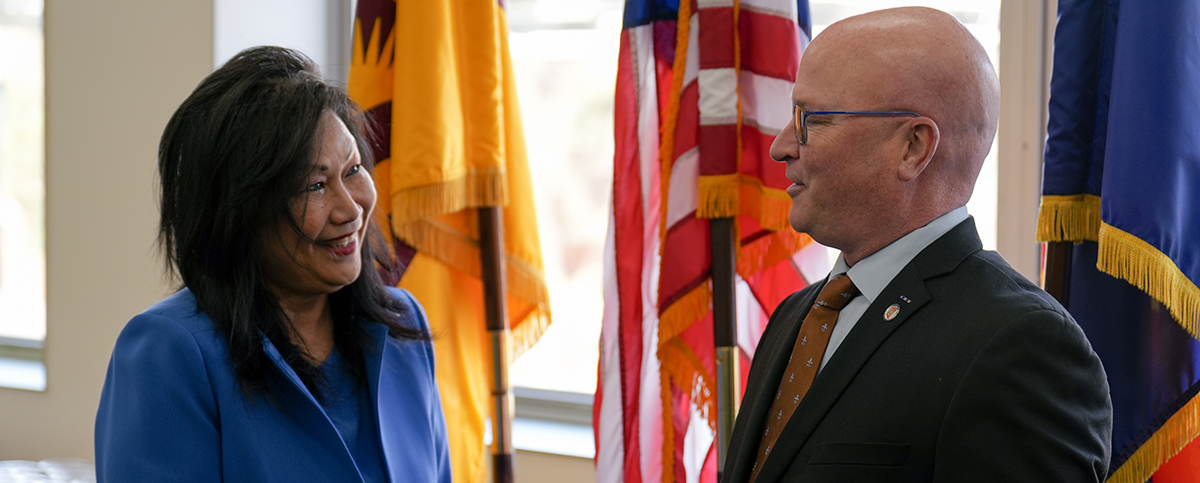
Board announces hire of Wade Thompson to support ABOR’s initiative to expand defense collaboration
Retired Air Force colonel brings his unique blend of military and academia experience to propel Arizona Board of Regents' university-defense initiative forward.
To strengthen its commitment to advancing partnerships between Arizona’s public universities and the defense sector, the Arizona Board of Regents announces it has hired retired Air Force Col. Wade Thompson as its first director of military affairs — a key role designed to expand collaboration with Arizona’s military installations and defense industry.
This initiative underscores ABOR’s recognition of the critical intersection between academia and national security, ensuring that Arizona’s public universities remain at the forefront of defense-related research, workforce development and technological innovation. With Arizona ranking eighth nationally in 2023 as a recipient of federal defense spending, there is immense potential for the board and universities to play an even greater role in supporting the nation’s security priorities.
"This is an incredible opportunity to leverage the unique strengths of our public universities to drive national security and economic growth in Arizona," said ABOR Chair Cecilia Mata. "Col. Thompson’s deep understanding of defense policies and military relations makes him the right person to help us realize this vision."
For Thompson, this new position is a natural extension of a career that has encompassed the military, academia, combat and peacetime command positions, and the private sector. He’s been an A-10 pilot, the leader of three different Air and Space Operations Centers, and worked on Capitol Hill. In all, he’s held posts around the globe during his 28 years of active duty before retiring and moving into defense contractor roles with industry leaders Lockheed Martin, Raytheon and Northrop Grumman.
“I’ve been immersed in the national security and defense sector for over 40 years,” said Thompson. “I hope to apply all the valuable lessons and insights from my experiences to help advance this board initiative and make a lasting impact in the defense arena.”
A first-generation college graduate, Thompson is passionate about higher education. He holds a bachelor’s degree in astronautical engineering from the Air Force Academy and three master’s degrees from the University of Helsinki, Harvard University and the U.S. Air War College. He also spent time as a professor of aerospace studies and led the ROTC program at the University of Arizona.
Thompson will work to align the research and workforce development capabilities of Arizona State University, Northern Arizona University and the University of Arizona with the needs of the defense sector. He will offer specialized guidance to the regents on policies and strategies that promote partnerships and collaborations between Arizona’s public universities and the Department of Defense, military entities and defense-related industries.
ASU, NAU and the U of A are each well-positioned to expand their impact as key players in the research and innovation driving national security advancements, with the goal of making Arizona a top destination for defense innovation and workforce development. Thompson is up for the challenge. To get there, he aims to incrementally improve, starting with a push to seventh place for the universities’ federal defense spending ranking and steadily elevate the universities' standing as leading partners.
"This is a new role, and that can be challenging. But I believe it will have an impact and that is what brought me to it,” said Thompson. “I am eager to work alongside the universities, and with military and defense industry leaders to help position Arizona as a premier hub for the defense industry.”
At the November board meeting, ABOR announced its new initiative aimed at enhancing collaboration with Arizona’s military installations and the DoD. This effort emphasizes the board's commitment to strengthening the long-standing partnership between Arizona’s public universities and defense agencies, advancing both state and national security priorities. The board also plans to host a military summit in the fall, bringing together military leadership, industry experts, business leaders, policymakers and university officials.
 Back to Listing
Back to Listing